- Home
- Raymond E. Feist
Jimmy the Hand Page 3
Jimmy the Hand Read online
Page 3
Now del Garza sat silently cursing the day he had left his native Rodez to seek service in Bas-Tyra. Duke Guy was a hard man, but a fair one, but since coming to Krondor, del Garza had been forced to suffer the companionship of Jocko Radburn. That murderous maniac had the face of a simple peasant, but the heart of a rabid wolf. And his inability to do something as simple as keep a sixteen-year-old girl under lock and key was now threatening to turn del Garza’s life upside down.
Radburn had left del Garza in command of the secret police, and had commandeered one of the Duke’s ships, the Royal Griffin, and set off in hot pursuit less than an hour after the girl and her companions had fled the city. Now del Garza was faced with cleaning up this mess and, more importantly, positioning himself so that if Radburn failed to recover the escaped Princess, as little blame attached itself to him as possible.
A knock came and he answered, ‘Yes?’
A guard opened the door and looked through. ‘He’s coming, sir.’
Del Garza nodded, keeping his face calm as the door closed again. He had appropriated this office for a very specific interview, following which he would address his subordinates. But first, very much first, he would speak to the captain of the Paragon, a blockade ship that had just happened to drift off her position at a critical moment this morning.
He heard a man’s voice approaching, clearly raised in anger. There were no answering voices as the one who shouted came closer. A knock sounded on the closed iron-strapped wooden door and del Garza contemplated it for a short interval. There had been a momentary silence after the knock, but it was soon broken again by the protesting, expostulating voice.
‘Come,’ the acting governor said quietly.
The door opened instantly and del Garza met the eye of his subordinate as he entered the office. He saw both amusement and exasperation there and not a little disgust. For an instant del Garza wondered if the thinly-veiled contempt was directed at him, but at the last, the man glanced to the side, and del Garza realized the scorn was directed at the man who followed close behind.
Though not a small man, the secret police operative was thrust aside by a very large, very self-important one wearing the salt-stained coat of a sea captain.
‘What is the meaning of this?’ the captain demanded. ‘I must protest this treatment! I am a gentleman, sir, and I was brought here under protest! I was given a missive summoning me to a meeting with the acting governor, but no sooner did we make dock than this—’ he sneered at the fellow he had shoved, ‘—brigand tells me that I am under arrest and seized my sword. My sword, sir! What possible excuse could there be for such an action?’
He stopped and stared at the man behind the desk. ‘And who, if I may ask, are you, sir?’
Del Garza stared at him while the other two guards took up position behind the Captain. Captain Alan Leighton was indeed a gentleman, the third son of a very minor nobleman whose family were willing to pay to get him out of the ancestral home; in other words, someone of less real use than the average dock-walloper or ditch-digger. And he would have been dismissed from either position for incompetence within a week. His commission and his ship had been bought for him, not earned, while better men had to wait. The Baron knew his type and despised him. He was a man who was just important enough to be a nuisance, and not important enough to have any real value.
‘I am the Governor,’ he said, his voice as flat and cold as a window in midwinter.
The captain shifted his feet and looked at him uncertainly. Del Garza was an ordinary enough looking man; rat-faced, and his dress was of simple if expensive weave.
‘Indeed?’ the Captain said dubiously.
‘Indeed,’ del Garza confirmed quietly. ‘Be seated, Captain Leighton.’ His nod indicated a stool in front of the desk.
The Captain looked at it, then at the acting governor in disbelief. ‘On that?’ he sneered. ‘The thing will collapse.’ Leighton turned to one of the guards. ‘You there, bring me a proper chair.’
Del Garza leaned forward. ‘Sit,’ he clipped out. ‘Or be seated.’
The two guards moved a step closer to the blustering seaman, ready to reach out and slam him down. For the first time Leighton actually looked at their faces; he blinked, and slowly sat down, his gaze moving from each of the men in the room to the next. ‘What is the meaning of this?’ he asked. His voice tried to carry the bluster, but there was a quaver in it now.
In answer, del Garza rubbed one hand over the stubble on his jaw and gave him the glance that a tired man would give a buzzing fly. Every irritation and annoyance from the day he had set foot in Krondor until this morning rose up and seemed to resolve itself in the person of this pitiful excuse for a sea captain. Del Garza decided at that instant that Leighton needed to pay for them all. ‘Can’t you guess?’ he asked through clenched teeth. ‘Can’t you even begin to guess?’
Leighton gazed at him like a mouse fascinated by a snake. ‘No,’ he said at last. He leaned back, remembered just in time that he was on a stool and frowned. Leaning forward, the Captain went on the attack. ‘I say, is this some form of joke? If so it is in very poor taste and I assure you I shall complain of it to your superior.’
‘Do I look as if I’m joking?’ del Garza asked. ‘Am I smiling? Am I, or my men, laughing? Does this seem to be an atmosphere of mirth and good-fellowship to you?’
Nervous perspiration dewed the Captain’s broad brow, his eyes shifted left and right. ‘No,’ he said and shook his head. ‘I suppose not.’ He straightened. ‘But I still do not know why I am here.’
‘You have been arrested for treason.’
Leighton shot to his feet, ignoring the guards who moved yet another step closer. ‘How dare you, sir? Do you know who I am?’
‘You are the noxious toad who took a bribe to break the blockade,’ del Garza said. ‘During wartime such an act can be nothing less than treason.’
‘I did no such thing!’ the captain insisted.
The Baron smiled. ‘Do you know how many fools have tried to lie to the Duke’s agents?’ he asked. He waved his hand casually at the two burly guards and at several other men whom he knew waited outside. ‘Usually their next remark is something on the order of: Stop! Gods, please stop!’
‘I admit that my ship floated off-station,’ Leighton blustered. ‘Such things happen occasionally, there’s nothing deliberate in it. An anchor bolt rusted through and the tide caught our bow. It was merely misfortune that it happened at that particular moment. When I heard the commotion I rose from my bed, came topside and corrected the situation at once. At the very worst it was dereliction of duty, though even that would be coming it a bit high under the circumstances.’
Del Garza raised his brows and leant back in the commander’s chair with his hands clasped over his lean stomach. ‘Indeed?’ he said.
‘Of course,’ Leighton said, allowing a touch of his former haughtiness to creep into his tone. ‘I tell you these things happen, ‘tis no one’s fault, my good man. No one could have predicted that a ship would choose that particular moment to . . .’
‘We know the Upright Man bribed you.’ The acting governor waited for the explosion, but none came; the Captain merely stared at him, his mouth opening and closing like a gaffed fish. Not only guilty then, but the man had no spine. ‘What was it, the gold? Or some misplaced sense of loyalty to Prince Erland’s family?’
‘We have known them a long time . . .’ Leighton began.
Del Garza cut him off. ‘You may as well admit it, you know. We have proof.’
The Captain shook his head silently.
‘Oh, but we do,’ del Garza insisted. ‘We have our own sources inside the Mockers, you know.’
They didn’t, of course, have either—proof, or sources. But it was obvious to the secret policeman that the Mockers had an interest in freeing the Princess Anita. It was certainly Mockers he and his men had been fighting this morning. Besides, every instinct he had told him that it was beyond unlikely that a ship wou
ld just ‘happen’ to drift off-station at precisely the wrong moment.
The lie came easily though, because if del Garza was going to have to answer for Anita’s escape—and he was—then others would answer first and far more painfully.
Leighton licked his lips. ‘You could hardly call it treason,’ he said.
Del Garza leaned forward blinking rapidly, his brows raised incredulously. ‘Oh, yes,’ he said. ‘Taking a bribe deliberately to disobey orders during wartime could never be anything else.’
‘We are hardly at war with the Mockers,’ the Captain argued.
‘We are always at war with the Mockers,’ del Garza corrected, his voice flat. ‘That it has never been formally declared makes it no less a war. For if we were not at war with them, I assure you these thieves and murderers-for-hire are and have always been at war with the decent citizens of Krondor.’
‘They are hardly worthy . . .’ Leighton began.
‘Opponents?’ Del Garza sneered. ‘If their money is good enough for you then why shouldn’t they be considered . . . worthy?’
The Captain pressed his lips together and took a deep breath, then he straightened. ‘I should like to see this “proof” you claim to have.’
Del Garza chuckled, an impulse he couldn’t control. ‘Are you now going to claim innocence, after all but admitting your guilt?’
‘I have not admitted any guilt,’ the Captain said. ‘Come, come, you shall have to produce the proof at my trial.’
With a sad shake of his head the Baron asked: ‘Would you really put your family through the shame of a trial when the conclusion is inevitable? Must we prove to them and all the world your villainy?’
The colour drained from Leighton’s face. ‘What are you suggesting?’ he demanded, clearly shaken.
‘You need do nothing radical,’ del Garza said, suddenly all generosity. ‘Naturally you cannot keep your commission.’ He drew a document from a small pile and pushed it toward the captain along with a quill pen already resting in an ink stand. ‘Herein you resign your commission; just sign at the bottom of the page, and the next page as well and then we’ll send you home.’ He lifted the pen from the inkwell and proffered it to Leighton with a slight smile. ‘Your older brother wouldn’t be the first nobleman who had to find a second career for a younger brother; much less a problem than shaming the family name.’
‘That is all?’ the Captain asked, taking the pen hesitantly.
Del Garza nodded. ‘We will take care of everything else. All the arrangements,’ he clarified. He pointed to the bottom of the page. ‘If you would,’ he invited.
As one hypnotized, Leighton signed. Del Garza lifted the corner of the page to expose the one beneath.
‘Sign here as well, if you would be so kind.’
With a shaky hand the Captain signed the bottom page as well and the acting governor drew them back, sanded the signatures and shook them dry.
‘Very good,’ he said. ‘But for one minor detail that concludes our business.’
Leighton mopped his brow with a handkerchief. ‘What is that?’ he asked.
At del Garza’s nod the three guards stepped forward; two caught hold of the captain’s arms while the third whipped a garrotte around his neck. The stool went over with a crash, and Leighton’s legs became caught up in it so that he couldn’t get his feet under him. Del Garza cocked his head, watching the consciousness of imminent death and agony flood into the man’s eyes. Soon his heels beat a brief tattoo on the floor and after a very few moments he was dead.
The Baron neatly folded and sealed the two sheets of paper.
‘Poor fellow,’ del Garza said to the guards. ‘Carry him to his quarters and arrange things there. Make sure the bracket he hangs himself from is stout; he was a fleshy sort.’ He handed the papers to the chief guard. ‘Don’t forget to leave his resignation and most important, his confession, where they’ll be easily found.’
The guard smiled as he took the papers. ‘That was neatly done, sir,’ he said. ‘Makes me feel like we’re getting a bit of our own back.’
Del Garza looked at him for long enough that the man knew the Baron wasn’t amenable to flattery, then dismissed him.
Alone, del Garza considered his choices. Leighton had to die; there was no other option. Had he remained alive, word of the Duke’s vulnerability would eventually spread. Loyalty to the Prince or avarice for Mockers’ gold, the reason for Leighton’s treason didn’t matter. What mattered was who would be looked at when Duke Guy returned from dealing with the Keshians in the Vale of Dreams.
Del Garza could put a fair amount of responsibility on Radburn’s shoulders, with justification. His iron grip on the city had bred discontent, and the way in which he ran roughshod over the Prince’s own guards and the city’s constables would be certain to drive some firmly into the Prince’s camp.
The handwriting was on the wall, as they say; Erland was dying, no matter what the healing priests and chirurgeons did to hold death at bay. With no son to inherit, Anita would be a prize for any ambitious man. And with the King having no heirs, her husband was but one step from the throne in Rillanon. So, Guy would marry Anita, and some day, sooner rather than later, del Garza judged, Guy du Bas-Tyra would become King Guy the First.
Del Garza tapped his chin with a forefinger as he wondered where he might come out in all this. He was not by nature an ambitious man, but circumstances seemed to dictate that his choice was to rise or fall; there was no standing still. Hence, he would choose to rise. Who knew? An earldom in the east, perhaps near Rodez?
But to rise, he had to avoid falling, and to do that, he had to survive Guy’s wrath when he returned and found the girl missing. He hoped Radburn would return soon with the girl in tow, or not return at all. If Jocko had the good grace to get himself killed in the attempt, everything would be his fault by the time del Garza got finished explaining things to the Duke. And that meant having lots of other guilty parties to parade before him.
‘Cray!’ he shouted, summoning the captain of the guard’s secretary. When the man appeared he said, ‘I want every commander of every unit involved with this morning’s mission, from the sergeants up, in this office in one hour.’
‘Yes, sir,’ Cray said and sped off.
Del Garza sat back in the commander’s chair, enjoying the way Cray had leapt to obey, enjoying the privilege of taking over the commander’s office, enjoying the memory of the look on Leighton’s face when he had realized del Garza held the power in Krondor for the moment.
He turned his mind away from feeling any pleasure at the prospect of authority. How could he enjoy anything when his lord had been humiliated this morning? How could that wicked girl abandon her father so? And why? So that she would not have to partake of the honour of wedding the Duke du Bas-Tyra; one of the greatest, one of the noblest men in the Kingdom! How dare the little baggage treat his lord so?
Poor Prince Erland, to have such an uncaring child. Not that he was much better, for he, too, had defied his lord’s will. Well, he’d just have to suffer the fate to which his own daughter had condemned him. Del Garza considered: perhaps if the Prince was relocated to one of his draughtier dungeons, and word was leaked that he would remain there until his daughter returned . . .? He considered that a move to be made if Radburn didn’t return with the girl soon. If the girl had been coerced into leaving the city, it might convince her to return of her own volition, and if the Prince didn’t survive the ordeal, that was another problem that could be laid at Jocko’s feet when the Duke again graced the city.
Del Garza sighed. So much to be done, and he so much preferred routine to the unexpected. But, at least he knew the task at hand.
These . . . thieves, these nothings must be brought to heel, whipped into place like the dogs they were. That they should dare to steal Guy du Bas-Tyra’s rightful bride, interfering in matters they knew nothing about, and indeed should know nothing about . . .
With an effort del Garza calmed himself. He too
k deep breaths until his heart rate returned to normal. He shouldn’t waste this anger; he should harbour his fury until the men came, and then release it. Things were going to change around here; soon and forever. By the time Guy du Bas-Tyra returned from the south, Krondor would be a city in order and under firm control. Yes, he thought, in control.
He called for a parchment and pen and set his mind to the list of things that would have to be done, and first on that list was to round up as many of the Mockers as could be ferreted out of whatever dark warren hid them.
THREE
Aftermath
The crossroads was crowded.
Hotfingers Flora was chatting and laughing with her friends while tossing saucy, flirtatious glances at every passing male when the wagon pulled up beside them. At first she didn’t give it much of a glance; the streets were busy with men on foot, porters with heavy loads, handcarts full of golden loaves of bread, cloth, boxes and bales, a sedan-chair—she cast an envious glance at the courtesan lolling within it—and any number of farmers’ wagons hauling in the city’s food.
When it stopped in front of her, she realized that this one wagon was different. It was a curious sight, with high sides and hoops over the top as though it was meant to be covered by a canvas tilt. But there were crossbars tied onto the hoops with rawhide thongs, making it look like a cage. It was driven by a pair of Bas-Tyran guards and followed by four more on foot, their hobnails a counterpoint to the clangour of iron-rimmed wheels on stone and their halberds swaying as they marched in step.

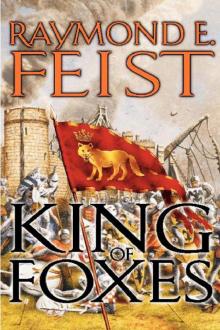 King of Foxes
King of Foxes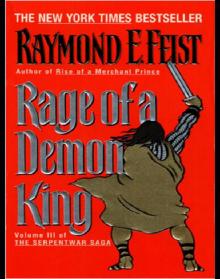 Rage of a Demon King
Rage of a Demon King Silverthorn
Silverthorn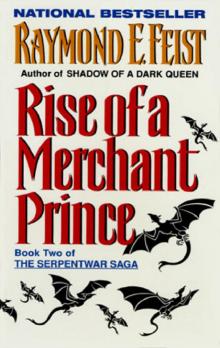 Rise of a Merchant Prince
Rise of a Merchant Prince Into a Dark Realm: Book Two of the Darkwar Saga
Into a Dark Realm: Book Two of the Darkwar Saga Shadow of a Dark Queen
Shadow of a Dark Queen A Kingdom Besieged
A Kingdom Besieged Honored Enemy
Honored Enemy Talon of the Silver Hawk
Talon of the Silver Hawk The Complete Legends of the Riftwar Trilogy
The Complete Legends of the Riftwar Trilogy Exile's Return: Conclave of Shadows: Book Three
Exile's Return: Conclave of Shadows: Book Three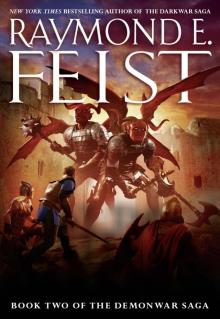 At the Gates of Darkness
At the Gates of Darkness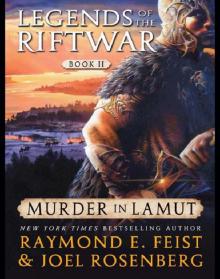 Murder in LaMut: Legends of the Riftwar: Book II
Murder in LaMut: Legends of the Riftwar: Book II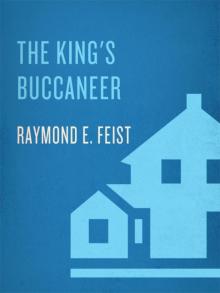 The King's Buccaneer
The King's Buccaneer Flight of the Nighthawks
Flight of the Nighthawks The Riftwar Saga
The Riftwar Saga A Darkness at Sethanon
A Darkness at Sethanon Magician: Master
Magician: Master A Crown Imperiled
A Crown Imperiled Magician: Apprentice
Magician: Apprentice Midkemia
Midkemia Wrath of a Mad God
Wrath of a Mad God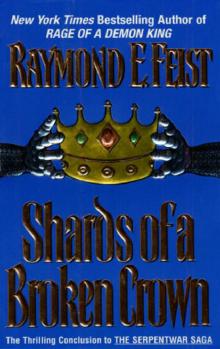 Shards of a Broken Crown
Shards of a Broken Crown Magician's End
Magician's End King of Ashes
King of Ashes Jimmy and the Crawler
Jimmy and the Crawler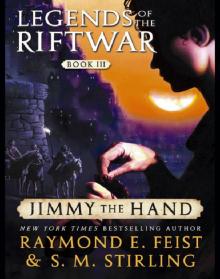 Jimmy the Hand: Legends of the Riftwar, Book 3
Jimmy the Hand: Legends of the Riftwar, Book 3 Queen of Storms
Queen of Storms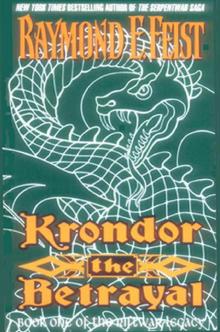 Krondor: The Betrayal
Krondor: The Betrayal Magician
Magician Krondor: The Assassins
Krondor: The Assassins Honoured Enemy
Honoured Enemy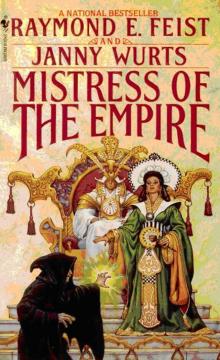 Mistress of the Empire
Mistress of the Empire The Complete Empire Trilogy
The Complete Empire Trilogy Legends 1 - Honoured Enemy
Legends 1 - Honoured Enemy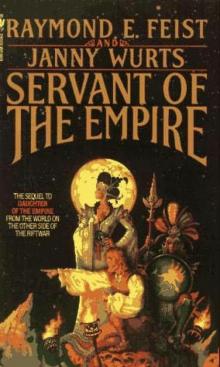 Empire - 02 - Servant Of The Empire
Empire - 02 - Servant Of The Empire Murder In LaMut
Murder In LaMut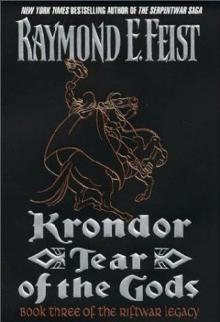 Krondor Tear of the Gods
Krondor Tear of the Gods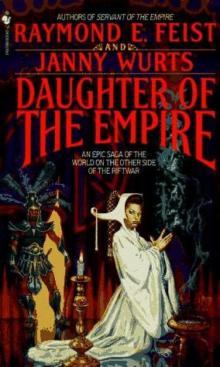 Empire - 01 - Daughter Of The Empire
Empire - 01 - Daughter Of The Empire![King of Ashes [Book One] Read online](http://i1.bookreadfree.com/i1/03/30/king_of_ashes_book_one_preview.jpg) King of Ashes [Book One]
King of Ashes [Book One]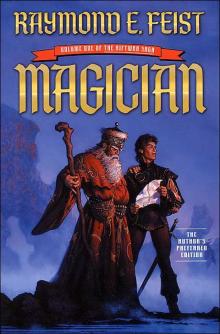 Magician (10th Aniversary Edition)
Magician (10th Aniversary Edition) Prince of the Blood, the King's Buccaneer
Prince of the Blood, the King's Buccaneer A Crown Imperilled cs-2
A Crown Imperilled cs-2 Exile's Return
Exile's Return Jimmy the Hand
Jimmy the Hand Book 1 - Magician
Book 1 - Magician Empire - 03 - Mistress Of The Empire
Empire - 03 - Mistress Of The Empire Darkness at Sethanon
Darkness at Sethanon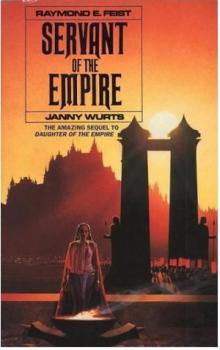 Servant of the Empire
Servant of the Empire A Crown Imperilled
A Crown Imperilled Rides a Dread Legion
Rides a Dread Legion Legends of the Riftwar
Legends of the Riftwar Daughter of the Empire
Daughter of the Empire The Riftwar Saga Trilogy: Magician, Silverthorn and A Darkness at Sethanon
The Riftwar Saga Trilogy: Magician, Silverthorn and A Darkness at Sethanon